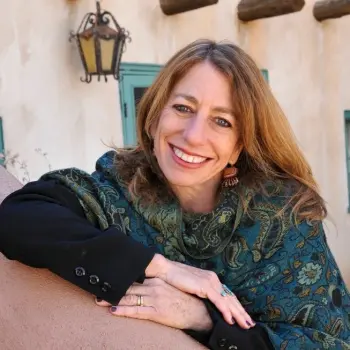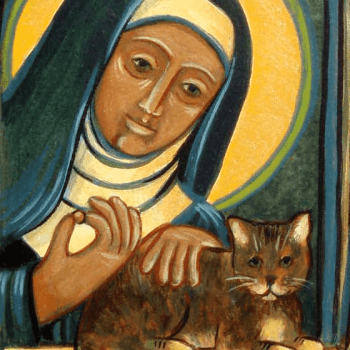
What if the secret to connecting with God was hiding in plain sight? What if it was so beautiful in its simplicity, that when we grasped it, we realized it could have never been any other way? And what if this secret was discovered not in our time, but by a Christian mystic living over 600 years ago?
The mystic’s name is Julian of Norwich and last year Julian of Norwich: The Showings was reissued with a new translation from Mirabai Starr (and a new subtitle, Uncovering the Face of the Feminine in Revelations of Divine Love). Today, I’ll focus on one aspect of Julian of Norwich’s teachings. It’s what Starr translates as “oneing.” But first some background on Julian.
Julian of Norwich was a fourteenth century Catholic anchoress, defined as a religious recluse, who Starr reports “spent the majority of her adult life cloistered in a small stone cell attached to a church” in Norwich, England. At the age of 30, in about the year 1363, she had a near-death experience, during which she has visions of Jesus. She also received “showings” from God, a series of spiritual revelations that lasted for days. The anchoress would spend much of her life deciphering what the showings meant.
Author Malcolm Gladwell wrote about “10,000 hours,” the idea that it takes 10,000 hours to truly master something. For instance, the Beatles practiced and played for 10,000 hours before they had a breakthrough. It’s safe to say that, cloistered in her small stone room for decades, Julian reached the 10,000-hour mark and then some. She wrote down her thoughts and experiences wanting to share her spiritual insights with others.
In the intro, Miriam Starr explains that Julian of Norwich’s goal was to “shift our attention from our own small foibles and get on with the holy task of loving God with all our hearts and all our minds and all our strength.” Julian’s God is “All love, incapable of wrath.” She also sees a feminine side to the Divine that I’ll write about in a few weeks.
After the initial showings, God remained a constant presence for Julian.
She prefaces her thinking with phrases like, “Our beloved brought all this to my mind and showed me these words: I am the ground of all your praying.” Her spiritual knowledge is intuitive and doesn’t come from reading or hearing sermons about the Bible, or through others in her spiritual community. She has established a direct connection with God.
She also has a unique way or referring to this connection, using some version of the word “one-ing” as in “we are always and forever oned with our Beloved.” It’s a wonderful word, isn’t it? You won’t find it in the dictionary, but its meaning seems to be clear. She becomes one indivisibly with God. There is no separation between her and her “Beloved.” God is present in each heartbeat and each breath.
Julian informs us that “Our Beloved is exceedingly happy about our prayer; he watches for it and yearns to receive it.” In turn, “God wishes us to pray without ceasing, and he wants to generously reward us for this.” She spends her time in contemplation of God and across the centuries she invites us to do the same. She tells us:
God wants us to know beyond all doubt that he himself is the ground of existence. He wants us to root our understanding in this truth, with all our might, all our intention, and all our purpose. He wants us to take our rightful place on this foundation and dwell there.
Julian redefines what it means to pray.
While Julian of Norwich spends much time in prayer and quiet contemplation, she does not give precise instructions on how to engage in the practice of oneing. There are no Hail Marys or rote prayers to be recited. No Bible passages to be consulted. It’s a process that happens internally within her and she does her best to explain the unexplainable.
For additional guidance we might look to Richard Rohr, who wrote the introduction to this book. He has talked elsewhere about a prayer practice of “putting the mind into the heart”. To do this, we literally bring our thinking down into the area of our heart, a space where “love lives and thrives.” You might remember this as you read the passages below from Julian of Norwich: The Showings, which have been rearranged and lightly edited.
Julian of Norwich on Prayer and Oneing
- The whole purpose for praying is to be made one with the vision and contemplation of the One we long for.
- Pray inwardly, even if it seems to give you no pleasure. It is bringing great benefit, even if you do not perceive it.
- Pray that he guides and directs you for the greatest good in this life.
- Give thanks, that’s also part of prayer, rejoice and thank him inwardly.
- When you pray for mercy and grace, it is impossible not to receive mercy and grace.
- He wants to help us! He wants us to be partners with him. All we need to do is let him pray through us. He looks at us through the eyes of love.
- The moment the soul is at peace within itself, it is immediately made one with God.
- When God reveals himself to our soul, we have all that we desire. We do not perceive any lack. We focus our attention on him … and totally lose ourselves in contemplation of him.
- The more the soul sees God, the more the soul desires to see God.
- God is nothing but goodness. Our soul is one-ed with him. For the goodness of God has made our soul so completely one with him that there can be absolutely nothing separating us.
- We allow ourselves to be filled with the overwhelming desire for oneing with our Beloved, to listen for his call. We delight in his goodness and revel in his love.
Julian of Norwich tells us not to be sad if we don’t receive “the object of our heart’s desire. “I truly believe that what is happening is either that a better time is coming for our wish to be granted or more grace is yet to be given—we are meant to wait for an even more marvelous gift.”













